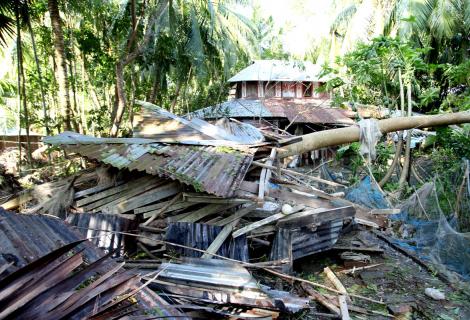Over 150 NGOs call on developed countries to stop using bullying tactics to block funding for climate disasters

Madrid, 29 November – As world leaders gather for the UN climate summit in Madrid, more than 150 organisations alongside climate activists Naomi Klein and Lidy Nacpil, have written to environment ministers calling for a climate disaster fund to support communities hit by the climate crisis.
At the 25th Conference of the Parties to the UN Framework Convention on Climate Change (COP25) next week, governments are set to begin negotiating finance for the devastation caused by climate disasters, such as flooding, droughts and rising sea levels.
But developed countries – those most responsible for the climate crisis – including the UK, US, EU, Australia and Japan, have spent years blocking concrete progress to create funding and debt relief for countries in the Global South most affected by rising global temperatures.
Harjeet Singh, global lead on climate change for ActionAid, says: “For six years, wealthy countries have been ignoring developing nations’ demands for financial support to repair the loss and damage caused by climate disasters. Governments from the Global North have even refused to set up a group to discuss this issue.
“Meanwhile, the climate crisis has been causing death, despair and displacement in the Global South. This bullying of the countries hardest hit by climate change, by those that got rich from extracting and consuming fossil fuels, must end now.”
ActionAid, the Jubilee Debt Campaign, Stamp Out Poverty and the International Trade Union Confederation (ITUC) are among the organisations and unions – representing millions of workers and those living on the frontline of the climate crisis – joining forces to demand a new fund to cover the soaring costs of climate disasters in the Global South.
The open letter states: “The under-signed organisations, recognising that the UN finds that climate disasters are now occurring at the rate of one per week and are set to cost at least $300 billion per year by 2030, call for an end to the stalemate in negotiations and the creation of a comprehensive financing facility, including debt relief, for developing countries experiencing such disasters.
“Without finance to help countries cope with climate-induced loss and damage, the most vulnerable parts of the world will sink deeper into debt and poverty every time they are hit by climate disasters they did not cause.”
The Warsaw International Mechanism for Loss and Damage (WIM), which is being reviewed at COP25, was established in 2013 to support vulnerable countries already experiencing extreme and slow onset climate disasters, such as flooding, droughts and rising sea levels.
Six years on, the WIM has failed in its main purpose – to propose concrete, rights-based financing solutions for communities being hit by climate disasters.
Sarah-Jayne Clifton, director of Jubilee Debt Campaign, says: “This year’s climate talks present a crucial opportunity for governments to agree a new fund for countries on the frontline of devastating climate impacts.
“This is vital to ensure that rich countries and corporations pay for the crisis they are responsible for, rather than loading up impacted countries with unjust debt. Furthermore, we need commitment from lenders to an automatic moratorium on debt payments when disasters hit, to stop vital resources flooding out of countries when they are trying to recover and rebuild.”
Sharan Burrow, general secretary of the International Trade Union Confederation (ITUC), says: “Workers recognise the existential threat posed by climate change and the need for urgent action.
“Millions of climate migrants are fleeing disasters looking for safety after losing everything to floods, cyclones, rising sea levels and drought.
“Financing for climate-induced loss and damage is essential to providing certainty and support for workers and their families, enabling them to rebuild their lives and livelihoods after climate disasters.”
Ends.
For more information and interviews contact Jenna Pudelek in the ActionAid press office on jenna.pudelek@actionaid.org or +44(0)7795642990.
Notes to editors:
The letter, which is being sent to environment ministers, heads of delegation and COP25 President Carolina Schmidt, can be read in full here: https://actionaid.org/news/2019/more-150-ngos-sign-open-letter-calling-loss-and-damage-fund-debt-relief
Spokespeople available for interview about their experiences with climate disasters and their impact on communities in the Global South: Lidy Nacpil is coordinator of the Asian Peoples Movement on Debt and Development. She is available for interview from COP25. Lidy is based in Manila and has first-hand experience with the impact of climate disasters. She is an activist working on economic, environmental, social and gender justice issues in national, regional and global campaigns.
Heron Belfon is the project coordinator for Jubilee Caribbean, which campaigns to establish debt relief as an instrument for emergency response and reconstruction. She has direct experience of climate disasters, including mega storms like Irma, Maria and Dorian.